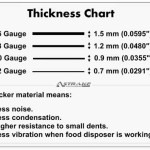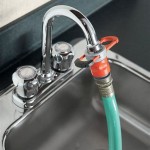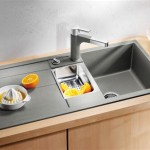Best Stainless Steel Gauge For Sinks: A Comprehensive Guide
Choosing a kitchen sink can feel overwhelming, with numerous materials, styles, and features to consider. Stainless steel remains a popular choice for its durability, affordability, and ease of cleaning. One important factor to consider when selecting a stainless steel sink is the gauge, which refers to the thickness of the metal. This gauge impacts the sink's strength, durability, and noise level. Understanding the different gauges and their implications can help you make an informed decision that suits your needs and preferences.
Gauge Basics: Understanding the Numbers
Stainless steel gauge is measured using the American Wire Gauge (AWG) system, where a lower number indicates thicker material and a higher number indicates thinner material. Thus, a 16-gauge sink is thicker than a 18-gauge sink, and a 22-gauge sink is the thinnest. While you may find numbers as high as 22, most residential sinks fall within the range of 16 to 18 gauge. This range offers a balance of durability and affordability, making it a popular choice for homeowners.
Gauge and Sink Performance
Durability and Strength
A thicker gauge, represented by a lower number, translates to greater strength and durability. Thicker stainless steel is more resistant to denting and scratching, making it ideal for heavy use and families with children. 16-gauge sinks are known for their exceptional resilience and are particularly well-suited to demanding environments. However, thinner gauges, like 18-gauge, are still strong enough for everyday use and are a common option for many homeowners.
Noise Level
Gauge plays a significant role in noise mitigation. Thinner stainless steel tends to resonate more easily, resulting in louder noises when water is running. 16-gauge sinks are known for their superior sound dampening capabilities, reducing the chances of clattering and echoing. 18-gauge sinks are typically quieter than 20-gauge or thinner options but may still exhibit some noise depending on the sink's design and installation.
Heat Resistance
Stainless steel naturally resists high temperatures, but thinner gauges are more susceptible to warping and discoloration from extreme heat. For sinks that frequently encounter hot cookware or boiling water, consider a 16-gauge option for its increased heat resistance. However, for regular use with normal temperatures, an 18-gauge sink should perform adequately.
Choosing the Right Gauge for Your Needs
The best stainless steel gauge for your sink depends on your individual needs, use patterns, and budget. Consider the following factors:
- Frequency of use: A high-traffic household with frequent heavy use may benefit from the extra durability of a 16-gauge sink.
- Noise sensitivity: If noise is a concern, a 16-gauge sink should mitigate noise levels.
- Budget: 16-gauge sinks tend to be more expensive than 18-gauge sinks due to their heavier construction.
- Aesthetic preferences: 18-gauge sinks often offer a sleeker, more contemporary appearance, while 16-gauge sinks may have a slightly thicker profile.
Ultimately, the best gauge for your sink is the one that best balances performance, aesthetics, and affordability. It is advisable to consult with a kitchen specialist or countertop installer for guidance and expert advice in selecting the appropriate gauge for your project.

The Ultimate Guide To Choosing A Durable Stainless Steel Kitchen Sink

Best Gauge For Stainless Steel Sinks Chica Dragon

A Guide To Stainless Steel Sink Gauges

Top 7 Best Stainless Steel Gauge For Kitchen Sinks Review 2024 Must Watch Before You

Stainless Steel Sink Gauges 16 Gauge Vs 18 Fenwick

Top 5 Best Stainless Steel Sink Gauge Review In 2024

Best Gauge For Stainless Steel Sinks Chica Dragon

32 Stainless Steel Single Bowl Kitchen Sink In Satin Kraus

Ruvati 30 Inch Workstation Ledge Undermount 16 Gauge Stainless Steel Kitchen Sink Single Bowl Rvh8310 Usa

Premium 32 Stainless Steel Single Bowl Kitchen Sink Kraus Usa







